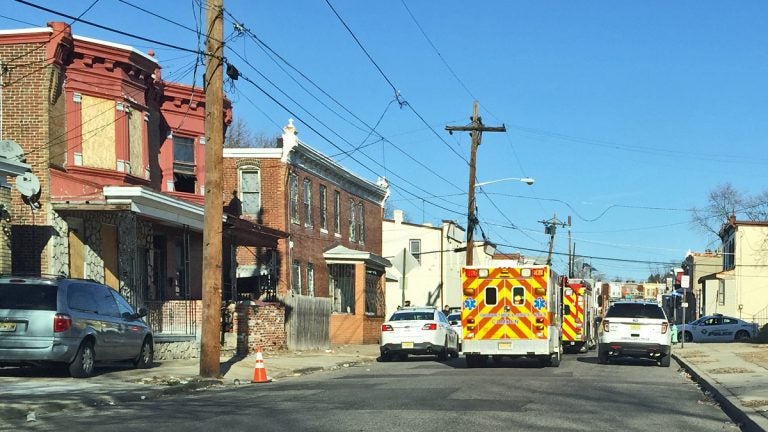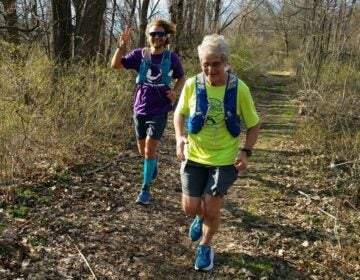Bill would let Cooper Health kick Virtua paramedics out of Camden

Ambulances on the scene of a car accident in Camden, NJ (Alan Tu/WHYY, file)
A paramedic-coverage bill sought by Cooper University Health Care advanced in Trenton Monday, but not before the chairman of the Senate Health, Human Services, and Senior Citizens Committee questioned its impact and described it as a dangerous approach to health policy.
The bill, S-2980/A-4526, would give Cooper the authority to operate Camden’s paramedic services, taking them away from rival Virtua Health.
Committees in both the state Assembly and state Senate released the legislation, but Sen. Joseph F. Vitale (D-Middlesex) said was “not a good bill.”
The legislation has been crafted in such a way that its primary effect would be on the city of Camden.
It would give hospitals classified at the highest level of trauma centers – “Level 1” — exclusive authority to provide paramedics in the municipality where they are located. It would basically affect Camden, since the state’s two other “Level 1” trauma centers – University Hospital in Newark and Robert Wood Johnson University Hospital in New Brunswick – already operate the paramedic services in their home cities.
If enacted, the bill will give Cooper control of paramedic and other emergency medical services in the city of Camden, leaving Virtua in control of paramedic services in the rest of Camden County.
Vitale said the bill essentially circumvents the state process that allows the state Department of Health to determine how to best provide paramedic services on a regional basis. He described this process, known as “certificate of need,” as thoughtful, open, and well-designed.
“I think it’s a dangerous health policy,” to bypass the “certificate of need” system for determining paramedic coverage, Vitale said, while also criticizing “an awful process by which we’re making these changes.”
Cooper representative Christine Stearns argued that Cooper would be able to operate more efficient emergency medical services by integrating its role as the city’s largest hospital -– and largest emergency department — with both paramedic services, also known as advanced life support (ALS), and the ambulances that transport patients to hospitals, known as basic life support (BLS).
Currently, ALS and BLS are generally selected separately throughout the state, with the state approving exceptions like those in Newark and New Brunswick on a case-by-case basis.
Generally, municipalities choose their BLS ambulance services individually, while the state chooses the ALS/paramedic services using the “certificate of need” process on a countywide or regional basis.
The bill wouldn’t affect which hospitals’ ambulances would transport patients in emergency situations.
Virtua officials say that they aren’t fighting to keep the paramedic services because of money – in fact, Virtua says it subsidizes Camden’s ALS coverage at a cost of $1.2 million annually. Virtua officials say they want to keep providing Camden’s paramedic services simply because they feel it they can best serve city residents.
Virtua has operated ALS/paramedic services in Camden for 38 years, while University Hospital of Newark operates the BLS services in the city — a legacy from its days as part of the University of Medicine and Dentistry of New Jersey, although it is reportedly looking to end its ambulance operations in Camden.
Vitale said that he believes that Cooper and every hospital in the state should be working with paramedics to better coordinate patient care, and that they could under current state law.
Virtua Assistant Vice President Scott Kasper said the legislation would affect Virtua’s entire regional paramedic model, since it was developed as an interconnected system. He contrasted the approach that Cooper wants for EMS coverage with the approach that Camden officials have taken with police coverage, making city police part of a force employed by county government.
Virtua operates three full-service, acute-care hospitals: Virtua Marlton Hospital in Evesham, Virtua Memorial Hospital in Mount Holly, and Virtua Voorhees Hospital. Only Virtua Voorhees Hospital is in Camden County, but the system also operates an outpatient center in Camden that includes an emergency department.
The Senate Health, Human Services, and Senior Citizens Committee has amended the bill twice. The first amendment altered a provision that could have affected Newark’s ability to change its BLS provider if it wasn’t amended – that amendment will not affect Camden. Newark has been considering changing providers to cut its costs for operating ambulances, but would have lost its ability to do so if the bill hadn’t been amended.
Sen. Ronald L. Rice (D-Essex) said he wanted to ensure that a bill driven by the interests of George Norcross didn’t affect Newark. Norcross, who serves as Cooper’s board chairman, is a powerbroker in regional and state politics.
“When you’re saying to me ‘Cooper,’ you’re saying ‘George’ ” Rice told Stearns, adding that his message to Norcross is, “I’m OK with the bill as long as we’re out,” referring to Newark no longer being affected as a result of the amendment.
The second amendment would require that the state Department of Health provide the same level of oversight over Cooper as it does for paramedic services chosen by the state through the “certificate of need” process.
The bill could also affect paramedic services in Hamilton in Mercer County. That’s because the measure would require state health officials to conduct an “expedited” review if a hospital that’s part of a system that includes a “Level 1” trauma center applies this year to operate paramedic services in its municipality.
Robert Wood Johnson University Hospital-Hamilton could apply to operate paramedic services in the municipality, since it’s part of the same hospital system as the New Brunswick “Level 1” trauma center.
Like Virtua in Camden County, Capital Health System and its predecessors have provided paramedic services throughout Mercer County for decades.
Vitale said the provision was “kind of an empty gesture,” since it’s unlikely that RWJ-Hamilton would be able to be approved through the “certificate of need” process.
None of the senators on the Health, Human Services, and Senior Citizens Committee spoke in favor of the bill, but five Democrats voted to release it “without recommendation.” It’s relatively unusual for the committee to release bills without recommending to the full Senate how other senators should vote.
Vitale joined two Republicans – Sen. Diane Allen (R-Burlington) and Sen. Dawn Marie Addiego (R-Atlantic, Burlington, and Camden) in voting against it, while Sen. Robert M. Gordon (D-Bergen) abstained from voting. The 5-3 tally allows the full Senate to vote on it. A similar vote occurred in the Assembly earlier on Monday, where the Assembly Health and Senior Services Committee released it on a 9-2 vote.
__________________________________________________
NJ Spotlight, an independent online news service on issues critical to New Jersey, makes its in-depth reporting available to NewsWorks.
WHYY is your source for fact-based, in-depth journalism and information. As a nonprofit organization, we rely on financial support from readers like you. Please give today.




